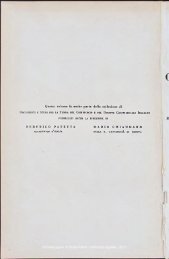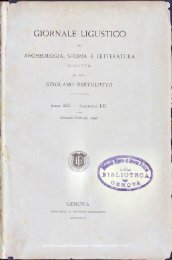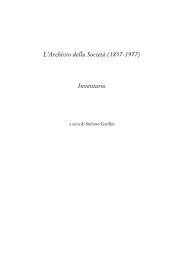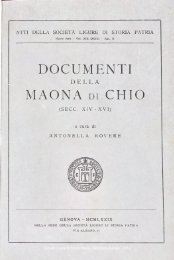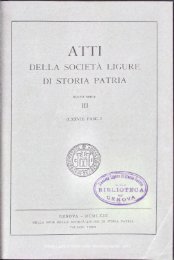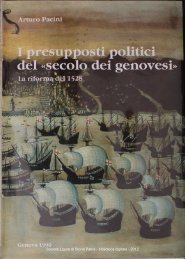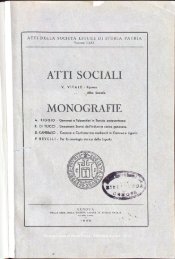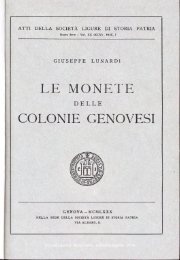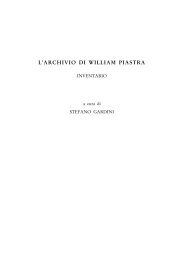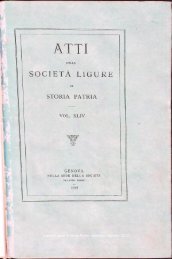Martino - Società Ligure di Storia Patria
Martino - Società Ligure di Storia Patria
Martino - Società Ligure di Storia Patria
You also want an ePaper? Increase the reach of your titles
YUMPU automatically turns print PDFs into web optimized ePapers that Google loves.
nevano i fatti; le loro <strong>di</strong>chiarazioni v en iv ano r a c c o lte d a u n<br />
notaio, privato o com unale77. D ue erano q u in d i i m o m e n ti:<br />
istruttoria segreta e u<strong>di</strong>enza p u b b lica. A q u a le d e i d u e r if e r ir e<br />
gli atti savonesi che si basavano su lla stessa p r o c e d u r a ? D alla<br />
risposta a questo interrogativo d ip endono le c o n c lu s io n i d el<br />
nostro lavoro: se si tra tta <strong>di</strong> is tru tto ria , r is u l ta a v v a lo r a to il<br />
carattere pubblico <strong>di</strong> tali atti e u lte rio rm e n te d o c u m e n ta to l ’in <br />
teresse del comune alla loro red azio ne d a p a r te d e l n o ta io d 'u f <br />
ficio; se, invece, si tra tta d ellu d ien za p u b b lic a , e q u in d i d i p ro <br />
babili copie, cadono, almeno p e r q u esto p u n to , le c o n c lu s io n i<br />
che siamo venuti traendo fin qui.<br />
La pratica savonese non se m b ra d is c o s ta rs i d a lla d o ttr in a<br />
giuri<strong>di</strong>ca78 del tempo. Il fo rm u lario p e r l'e s c u s s io n e d e i te s timoni<br />
era il seguente:<br />
L. (leguntur?) testes Iohannis contra A m brosium . E x eo quod<br />
(segue il titolo o tesi sui quali si invoca la testim o n ia n za ). Q uin<strong>di</strong> si<br />
davano i nomi dei testimoni ed, eventualm ente, altri tito li.<br />
Il giuramento avveniva alla p resen za d elle p a r t i 79: il te s te<br />
veniva quin<strong>di</strong> interrogato sul fa tto che aveva d a t o o rig in e alla<br />
causa, sul luogo e sulle circostanze dello ste sso , s u l g io rn o , sul<br />
tempo e sui presenti aU 'avvenim ento; nè m a n c a v a l'in te r r o g a <br />
zione finale se il teste era « lo catus vel ro g atu s, v e l a m ic u s sive<br />
inimicus alicuius partium », p e r ric erc are le e v e n tu a li c o llu <br />
sioni tra teste e parti o l’interesse che il p rim o p o te v a a v e re<br />
nel rendere testim onianza80.<br />
Il giu<strong>di</strong>ce era presente: il fa tto stesso c h e il n o ta io M a r<br />
tino riferisca espressam ente che u n a cau sa si s v o lg e s o tto u n<br />
77 Statuti <strong>di</strong> Noli cit., p. 80; S ta tu ti antichi <strong>di</strong> A lb e n g a cit., p. 357;<br />
Statuta communitatis Novariae cit., p. 4; negli statuti d i V ercelli (S ta tu ta<br />
communitatis Vercellarum cit., col. 1164) si prescrive « q u o d co nsules<br />
non teneantur interesse ad recipiendos testes, sed u n u s n o ta riu s consu <br />
lum eos recipiat ».<br />
78 Ranieri da Perugia, cit., p. 47.<br />
79 <strong>Martino</strong>, doc. 772 (c. 125 b).<br />
80 Sullo stesso argomento cfr. A. D’Amia cit., p. 79.<br />
— 26<br />
—<br />
Società <strong>Ligure</strong> <strong>di</strong> <strong>Storia</strong> <strong>Patria</strong> - biblioteca <strong>di</strong>gitale - 2012



